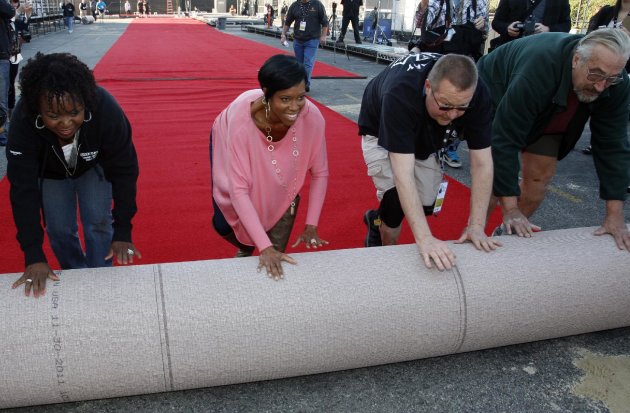President Barack Obama sits inside a Ford Mustang Shelby GT500 during his visit to the Washington Auto Show at the Washington Convention Center in Washington, Tuesday, Jan., 31, 2012. (AP Photo/Pablo Martinez Monsivais)
President Barack Obama sits inside a Ford Mustang Shelby GT500 during his visit to the Washington Auto Show at the Washington Convention Center in Washington, Tuesday, Jan., 31, 2012. (AP Photo/Pablo Martinez Monsivais)
President Barack Obama sits inside a Ford Mustang Shelby GT500 during his visit to the Washington Auto Show at the Washington Convention Center in Washington, Tuesday, Jan., 31, 2012. At right is Gerard Murphy, president of the Washington Area New Automobile Dealers Association. (AP Photo/Pablo Martinez Monsivais)
WASHINGTON (AP) ? President Barack Obama hailed the rebound of the U.S. auto industry on Tuesday, trumpeting an economic story he hopes to use to his political advantage in key Rust Belt states such as Michigan and Ohio. In a not-so-veiled shot at Republican presidential front-runner Mitt Romney, Obama said it was worth remembering that there were some leaders "willing to let this industry die."
Obama sat inside shiny new plug-in electric hybrids and burly trucks during a quick tour of the Washington Auto Show, declaring, "The U.S. auto industry is back." Obama emphasized his administration's rescue of General Motors and Chrysler from the brink of collapse as Romney was surging in Florida's GOP primary, a contest that could bring him a step closer to winning the Republican nomination.
The president did not mention Romney by name, but told reporters it was "good to remember the fact that there were some folks who were willing to let this industry die. Because of folks coming together we are now back at a place where we can compete with any car company in the world."
Romney spokeswoman Andrea Saul said the former Massachusetts governor was "thrilled" to see the companies' success but said it was "unfortunate that the government first attempted a bailout, which was precisely as unsuccessful as he predicted, cost taxpayers billions, and left the government improperly entangled in the private sector."
For Obama, the auto bailout has been a case study for his efforts to revive the economy and a potential point of contrast with Romney, who opposed Obama's decision to pour billions of dollars into the auto companies. The president's campaign views the auto storyline as a potent argument against Romney, the son of a Detroit auto executive who later served as Michigan governor.
Indeed, the auto show tour was just another example of the White House taking every opportunity to highlight its efforts to rebuild the auto industry, with aides frequently pointing to GM's reemergence as the world's largest automaker and job growth and profitability in the U.S. auto industry.
"The fact that GM is back, number one, I think shows the kind of turnaround that's possible when it comes to American manufacturing," Obama said.
As the industry was collapsing in the fall of 2008, Romney predicted in a New York Times op-ed that if the companies received a federal bailout, "you can kiss the American automotive industry goodbye." Romney said the companies should have undergone a "managed bankruptcy" that would have avoided a government bailout.
"Whether it was by President Bush or by President Obama, it was the wrong way to go," Romney said at a GOP presidential debate in Michigan in November. Romney said the nation has "capital markets and bankruptcy ? it works in the U.S. The idea of billions of dollars being wasted initially, then finally they adopted the managed bankruptcy. I was among others that said we ought to do that."
Both the Bush and Obama administrations found themselves in uncharted territory in the fall of 2008 and early 2009. GM and Chrysler were on the verge of collapse when Congress failed to approve emergency loans in late 2008. Bush stepped in and signed off on $17.4 billion in loans, requiring the companies to develop restructuring plans under Obama's watch.
The following spring, Obama pumped billions more into GM and Chrysler but forced concessions from industry stakeholders, enabling the companies to go through swift bankruptcies. Obama aides said billions in aid ? about $85 billion for the industry in total ? was necessary because capital markets were essentially frozen at the time, meaning there was no way for GM and Chrysler to fund their bankruptcies privately.
Without any private financing or government support, they argued, the companies would have been forced to liquidate.
Obama has tried to turn the tough decision into a political advantage in Ohio and Michigan, which Obama carried in 2008 and where unemployment has fallen of late. During last week's State of the Union address, Obama said the auto industry had hired tens of thousands of workers, and he predicted the Detroit turnaround could take root elsewhere.
Yet Obama's poll numbers in places like Ohio and Michigan remain in dangerous territory, under 50 percent, and the auto industry argument carries some inherent risks.
A Quinnipiac University poll in Ohio released Jan. 18 found Obama locked in a virtual tie with Romney in a hypothetical matchup, with about half the voters disapproving of Obama's performance as president. A poll in Michigan released last week by Lansing-based EPIC-MRA found 48 percent supporting Obama and 40 percent backing Romney in a potential matchup.
Republicans say the bailout still remains unpopular and the government intervention was hardly a cure-all. "The industry was bailed out but a lot of people lost their jobs," said David Doyle, a Michigan-based Republican strategist.
In a nation still soured on bailouts, the government owns more than a quarter of GM. The Treasury Department estimates the government will lose more than $23 billion on the auto bailout: GM is trading at $24 a share, well below the $53-per-share mark needed for the government to recoup its investment in the company.
Romney, facing attacks from Democrats on his work at private equity firm Bain Capital, has tried to use the GM and Chrysler cases to insulate himself against charges his firm gutted companies and fired workers. "How did you do when you were running General Motors as the president?" Romney said in a December debate. "Gee, you closed down factories. You closed down dealerships. And he'll say, well I did that to save the business. Same thing with us, Mr. President."
Obama, Vice President Joe Biden and others say the decision, while unpopular, saved an estimated 1 million jobs throughout the Midwest and say the industry is coming back.
As a result of the restructuring, the companies can make money at far lower U.S. sales volumes than in the past. Industry analysts predict U.S. sales will grow by at least 1 million this year over last year's 12.8 million units as people replace aging cars and trucks. And North American operations at GM, Chrysler and Ford are thriving, boosting their companies' earnings ? all signs that Democrats say will make the difference in the Midwest.
"I don't know how any reasonable person can fail to acknowledge that this rescue plan worked and the country has benefited," said former Ohio Gov. Ted Strickland, a Democrat.
___
AP Auto Writer Tom Krisher in Detroit contributed to this report.
Associated Pressmajor league alicia sacramone occupy chicago occupy chicago ron white ron white alcs




 Here in Chicago, we went from 57? last week to the low 20s? with 10 inches of snow in less than 24 hours. Some of us were thinking (hoping?) that winter might stay away this year, but no such luck. So we have hauled out the boots, shovels and gloves, and are digging in for a long winter.
Here in Chicago, we went from 57? last week to the low 20s? with 10 inches of snow in less than 24 hours. Some of us were thinking (hoping?) that winter might stay away this year, but no such luck. So we have hauled out the boots, shovels and gloves, and are digging in for a long winter.